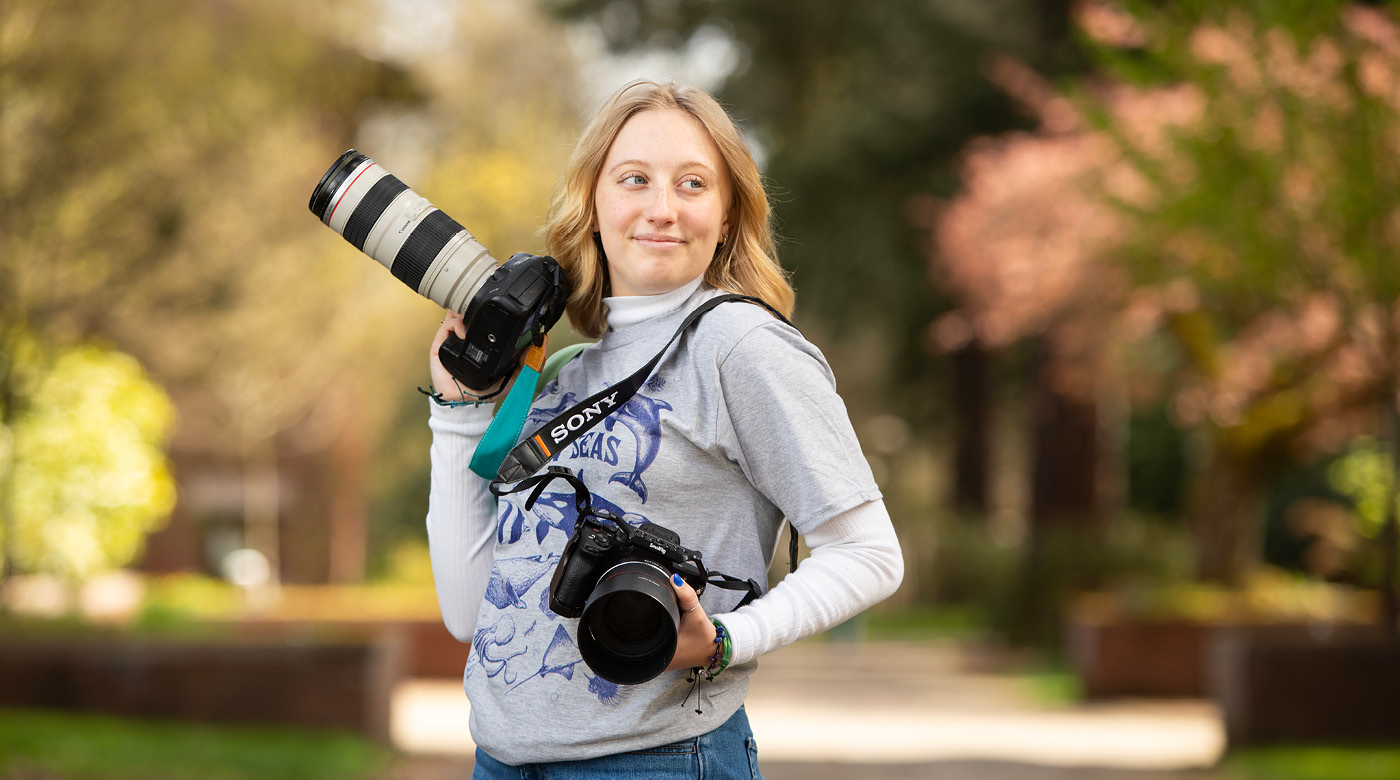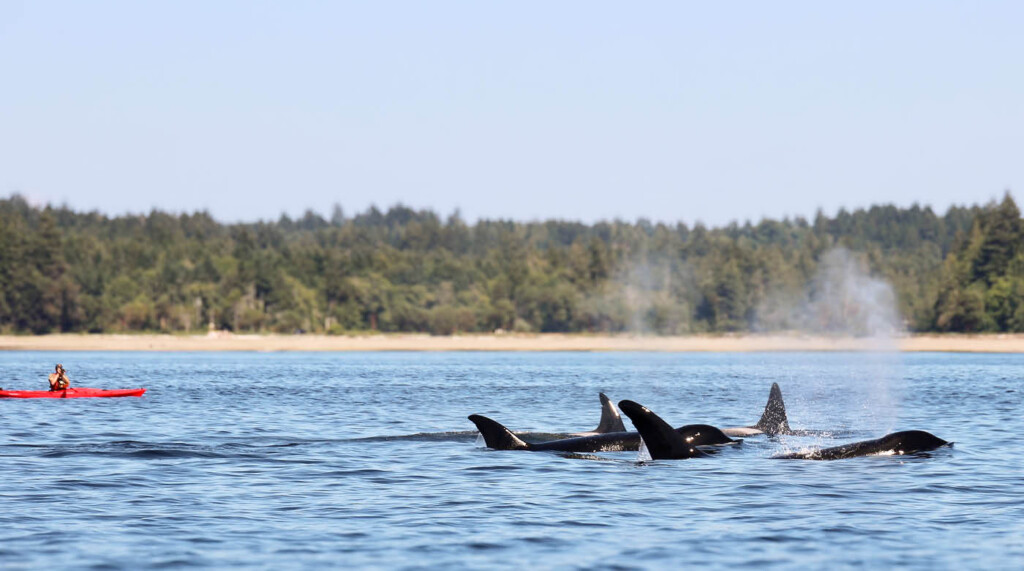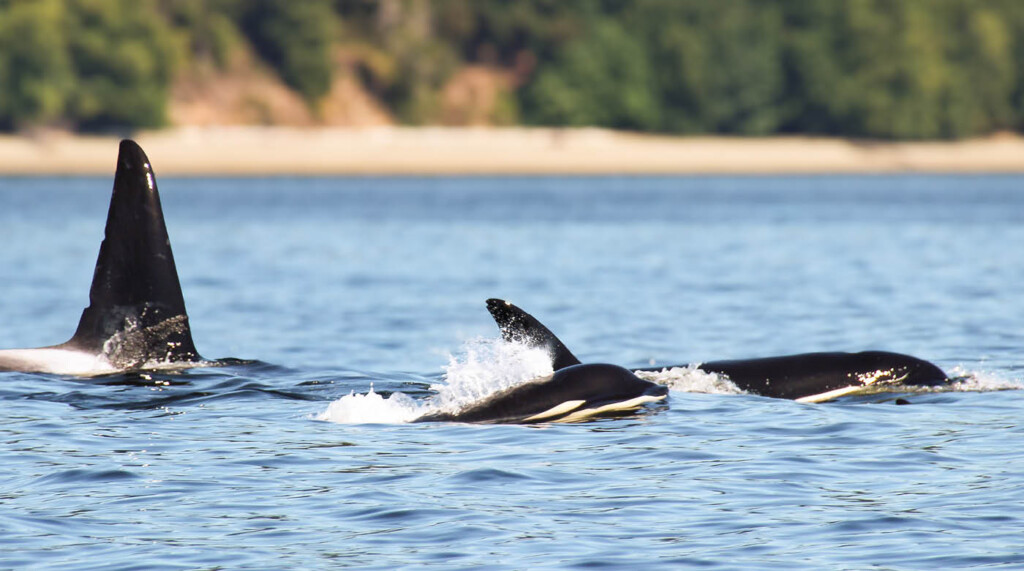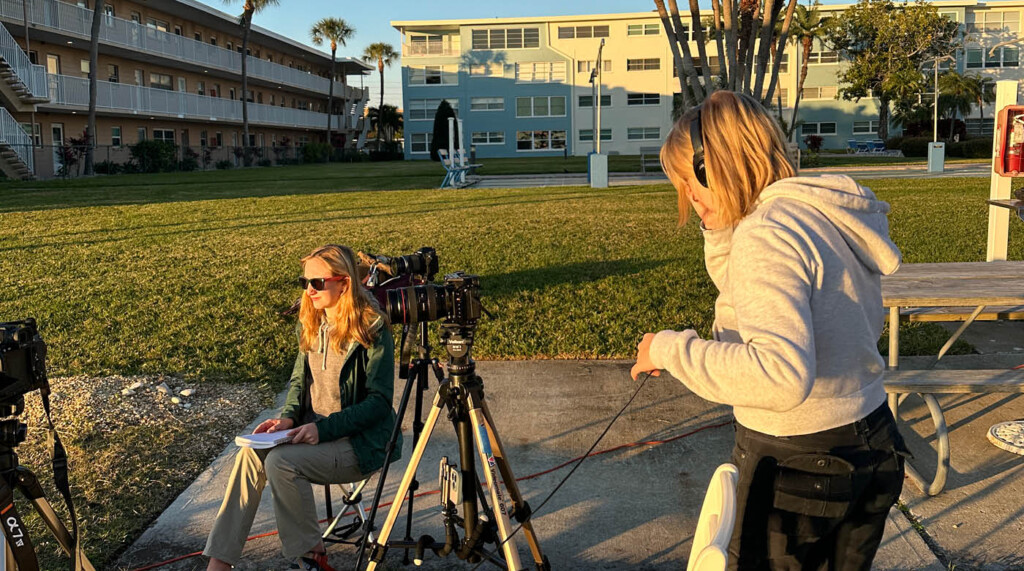Emma Stafki ’24 explores the challenges facing Puget Sound orcas in capstone documentary

Image: Emma Stafki ’24 is a communication studies major from the Key Peninsula. (Photo by Sy Bean/PLU)
By Lora Shinn
PLU Marketing & Communications Guest Writer
Emma Stafki grew up on Washington’s Key Peninsula, hearing stories about a tragedy in 1968. In nearby Vaughn Bay, her grandparents witnessed the heartwrenching capture of Hugo, a three-year-old orca whale.
Southern Resident orcas typically stay with their mothers their whole lives; losses echo throughout the orca community. Stafki’s grandparents told of the orcas’ haunting cries during and after Hugo’s capture and how the pod followed the boat until it was out of sight.
Hugo was taken to the Miami Seaquarium, where he lived alone in North America’s smallest orca tank. In 1970, he began sharing the cramped space with Sk’aliCh’elh-tenaut (also known as Tokitae or Lolita), who became the world’s longest-living orca in captivity — until she died in captivity in 2023.
In 1980, Hugo rammed his head into the pool’s walls until he died of a brain aneurysm at age 15. Orcas typically live until their 90s.
“Despite the significance of Hugo’s tragic story, it has not received the attention it deserves,” Stafki says.
That’s why Stafki, a communication studies major with a concentration in film and media studies, decided to make Hugo the focus of her PLU capstone project. She’s producing a documentary titled “Echos of the Sound” that explores the harsh realities and plight of the Southern Resident orca community. Around 73 of these orcas survive today, dwindling from a former estimated population of 200 to 300.
“I had the privilege of seeing the orcas every year, which deepened my affection and instilled a sense of responsibility to protect them,” Stafki says. “We’re using Hugo to demonstrate that we have a moral debt to the Southern Residents.”
She notes that the threat to orcas is no longer abduction but starvation due to a decline in Chinook salmon, their primary food source. Urgent action is needed, she says.


Southern Resident orcas photographed near Vaughn bay by Emma Stafki ’24.
A Family Affair
Since age 12, Stafki has been making films with her sister Annie, 5 years her junior. The duo entered many of these into the Gig Harbor Film Festival, which they won three times. Her sister — now a high school freshman — acted as co-producer and creator of “Echos of the Sound.”
Getting a great shot is challenging. “Orcas can be hard to spot and shoot, while [we’re] being respectful by staying at the required distance,” she says.
The process was aided by a large zoom lens and their readiness to drive to a local sighting alert from the Orca Network. “We drove up as quickly as possible, and it worked quite a few times — but they’re fast swimmers.”
For the film, Stafki and her sister interviewed PLU biology professor Michael Behrens, the National Oceanic and Atmospheric Association’s Southern Resident recovery coordinator Lynne Barre, and Lummi Tribal member and Sacred Lands Conservancy vice president Raynell Morris.
Stafki traveled to interview others, including Jason Colby, author of the book, “Orca,” and Howard Garrett, the co-founder of the Orca Network who was featured in the award-winning documentary “Blackfish.”
She also interviewed someone who cared for Hugo long ago. Animal and environmental activist Ric O’Barry is a former Miami Seaquarium trainer who appeared in the Academy Award-winning documentary “The Cove.”
Devastated by the psychological and physical damage marine mammals experienced in captivity, O’Barry founded the Dolphin Project. The project works to end captivity and rehabilitate dolphins or provide an engaging Indonesia-based sea pen if they cannot return to the wild.
The Dolphin Project’s Umah Lumba Rehabilitation, Release, and Retirement Center is the first permanent rehabilitation, release, and retirement facility for former dolphin performers. “‘Umah Lumba’ means ‘dolphin house’ in Balinese,” Stafki says.


Emma and Annie Stafki travelled to Florida to interview environmental activist Ric O’Barry.
PLU and Beyond
Stafki transferred to PLU after finishing two years of Running Start in high school. “When I visited the campus, I loved how welcoming everyone was,” she says.
Although she loved all of her classes and instructors, she particularly appreciated Marnie Ritchie’s multimedia production class, which launched her documentary. And Amy Young‘s advertising and PR class offered Stafki new concepts, such as how to market and advertise her documentary.
Stafki is currently an intern at the video production company Meraki Agency, where she’s engaged in various hands-on projects to improve her videography, photography, and business skills. Assignments have included brainstorming and shooting videos for Travel Tacoma.
She also picked up on-campus work experience as a PLU Marketing & Communications student photographer. Sy Bean, PLU’s University Photographer, “taught me so much about photography, and I wouldn’t be the photographer I am today without his guidance.”
Stafki might continue working for the Meraki Agency after graduation, or she may start her own business. She may also apply for an internship with O’Barry’s Dolphin Project.
“Ideally, I would like to continue creating documentaries with my sister to raise awareness and educate about our environment,” Stafki says. In the meantime, she will submit “Echos of the Sound” to several regional and international film festivals.
“This endeavor is not merely a student project. It is a deeply personal commitment that I have poured my heart and soul into. I’m driven to enact positive change so future generations can live on a sustainable planet.”
Follow the release of “Echos of the Sound” at @two_girls_take_on_the_world.


